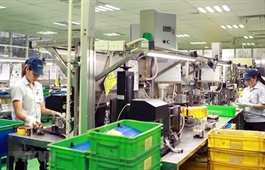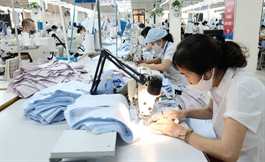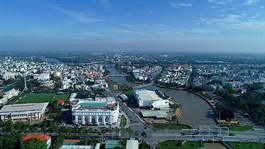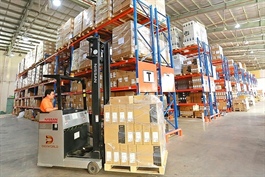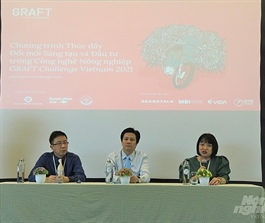Japanese pin hopes on Vietnam’s market
Japanese pin hopes on Vietnam’s market
New Japanese joint ventures in Vietnam are providing the evidence that Vietnam is becoming a haven for trusting investments as the globe attempts to fight out of the pandemic recessions.
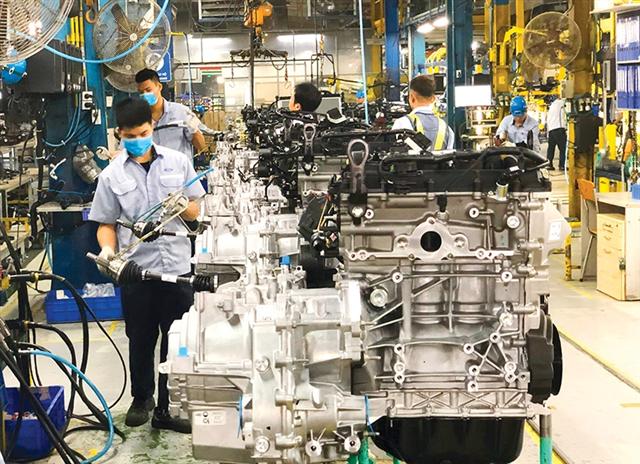
High-tech Japanese companies are contributing to growth here through expansion across various sectors. Photo: Le Toan
|
Japanese food giant Meiji Company has established a new group in Vietnam aiming for the further expansion of its infant formula business in the country. The amount of investment will be $1.89 million and operations commenced this month.
Meiji’s infant formula business in Vietnam mainly imports products from Japan and sales are growing steadily. The number of births per year in Vietnam is 1.5 million or approximately 1.7 times higher than that of Japan, and the market is expected to continue to expand in the future.
By establishing a new company in Vietnam, Meiji aims to conduct more timely and effective sales activities and conduct business operations rooted in the region.
Meanwhile, Sojitz Corporation and Vietnam Livestock Corporation JSC (VILICO), a company of the country’s leading dairy group Vinamilk, have reached an agreement to establish a new joint venture for the purpose of importing, processing, and selling beef products in Vietnam.
Vietnam’s annual beef consumption is currently close to 500,000 tonnes, and is expected to increase as income levels rise and population growth continues.
The joint venture, named Japan Vietnam Livestock Co., Ltd., will be capitalised at $2 million. Equity ownership will be split 49 per cent to Sojitz and 51 per cent to VILICO, while the joint venture is considering importing beef from such markets as Japan, North America, and Australia.
Meanwhile Toppan Cosmo, Inc., a subsidiary of Toppan Printing, has partnered with Osaka-based Studio Tec and Ho Chi Minh City-based Nu Design and Supply Co., Ltd. (NDS) to establish Toppan Equator LLC in Vietnam. The new company is focused on creation of high-quality 3D computer graphics for sales promotion and presentations by Japanese companies in the construction, interior design, and housing equipment and appliance sectors.
“Toppan Cosmo is very pleased to be able to fuse Studio Tec’s technical capabilities with NDS’ operational know-how to launch an organisation in Vietnam for production of high-quality 3D graphics, VR, and AR content with short lead times,” said Koichi Takenaka, Toppan Equator CEO. “We will leverage the visualisation content produced by Toppan Equator to bring new value to communication and contribute to growth in Japan and Vietnam through expansion across diverse sectors.”
It is apparent that more Japanese companies are pinning their hopes on the Vietnamese market in the midst of the global crisis. Commenting on the trend, Okada Hideyuki, chairman of the Japanese Chamber of Commerce and Industry in Ho Chi Minh City, said that the pandemic has disrupted the supply chain and manufacturing of accessories and spare parts, but Vietnam’s successful containment of the COVID-19 pandemic has captured the attention of Japanese investors, and so this is a big opportunity for Vietnam to woo more Japanese funds.
Data from the Ministry of Investment and Planning revealed that in the first three months of 2021, Japan registered total investment capital value of nearly $2.1 billion in Vietnam. As of present, Japan is the second-biggest foreign investor in Vietnam after South Korea, with 4,666 projects totaling more than $62.51 billion in registered investment capital.
The Japan External Trade Organization (JETRO) conducted a survey of over 900 Japanese companies about their business operations in Vietnam. Among them, nearly half plan to increase investment in the country in the next 1-2 years. They will focus investment on general products, high-value goods, sales, logistics, and research.
Although the expansion plan is 17.1 per cent lower than last year, the figure remains high in the midst of the coronavirus pandemic. Japanese companies are looking for new investment opportunities in line with the growing revenue in the local market (65.9 per cent), rising earnings from export (48.7 per cent), and Vietnam’s high economic growth and potential (44.1 per cent).
According to Hirai Shinji, chief representative of JETRO in Ho Chi Minh City, Vietnam has great potential for growth with a huge population coupled with increasing disposable income of the middle-class, making Vietnam a new darling for Japanese companies. He noted that Japanese companies already operating in Vietnam have started to expand their production here, providing strong evidence that they are placing trust in the economic development of Vietnam for the future.
“Meanwhile, the recent emergence of some top fashion brands like UNIQLO in the country reflects the growing interest of Japanese businesses in the potential domestic market. The expansion of UNIQLO is expected to draw more Japanese investors to Vietnam in the coming time,” he said.





